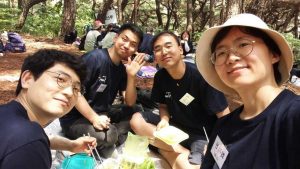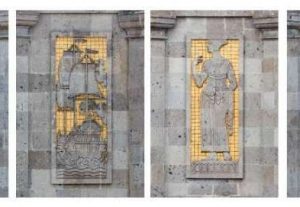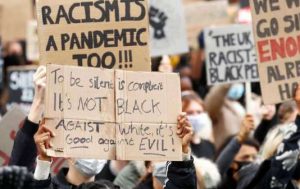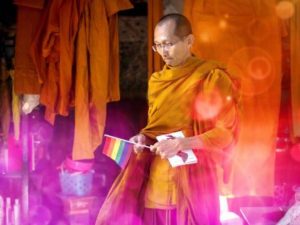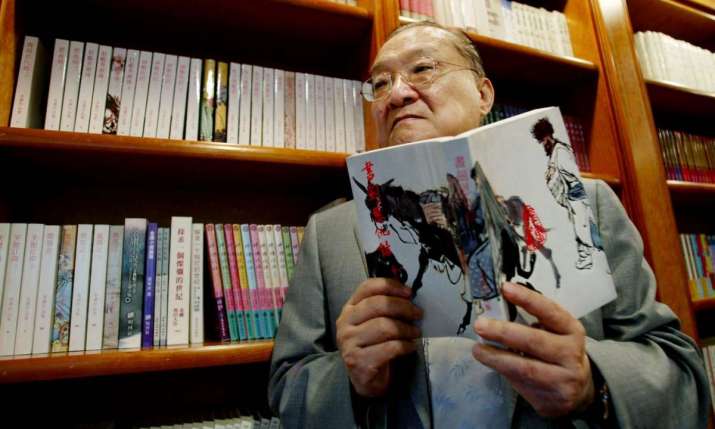
The late celebrated Chinese novelist, journalist, and Buddhist Louis Cha Leung-yung, better known to readers round the world by his pen name “Jin Yong” (金庸), was cremated yesterday afternoon at Hong Kong’s Po Lin Monastery, in a Buddhist ceremony attended by about 50 relatives and close friends.
Cha passed away surrounded by family members in Hong Kong on 30 October at the age of 94 following a lengthy illness. A private vigil was held at Hong Kong Funeral Home on Monday attended by dozens of figures from local media, business, showbiz, and political circles, and decorated with floral wreaths sent from senior members, past and present, of the Chinese government. A private Buddhist funeral service was held at the funeral home on Tuesday morning, followed in the afternoon by the cremation ceremony at Po Lin Monastery.
Po Lin Monastery, founded in 1906 on Hong Kong’s Lantau Island, is one of the most important historic Buddhist sites in the city. It is perhaps best known for the nearby 34-meter-tall bronze statue of Tian Tan Buddha, an image of Shakyamuni Buddha popularly known as “The Big Buddha.”
The private funeral service was attended by a host of prominent local figures and dignitaries, among them Alibaba co-founder Jack Ma Yun and former Hong Kong chief executive Tung Chee-hwa.
Ma noted that Cha, with whom he became good friends after a meeting in the eastern Chinese city of Hangzhou in 2000, had been a significant influence on his life. “If there is no ‘Jin Yong,’ I don’t know if Alibaba would have existed,” Ma wrote in a post on his Weibo account, praising Cha for his literary legacy, which emphasized morality, ethics, and chivalry, as well as his humble and genuine personality. “To be honest, ethical, responsible, and free. We strive hard to live the life that Cha taught us to.” (The Standard)
“The wuxia spirit promoted by Cha has become a core value of Alibaba,” Ma stated in a heartfelt tribute. “I have long admired Cha and he has been a source of deep inspiration for me. He will always be in my heart.” (South China Morning Post)
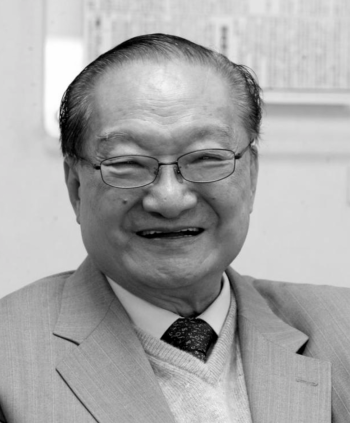
Hong Kong chief executive Carrie Lam Cheng Yuet-ngor, head of the city’s government, issued a statement in response to the news of Cha’s passing, describing him as “a learned man and an acclaimed writer,” and observing, “I was grieved to learn of [Cha’s] passing. On behalf of the Hong Kong Special Administrative Region Government, I would like to extend my deepest condolences to his family.” (South China Morning Post)
One of the most lauded and prolific Chinese authors of all time, and a respected journalist and community leader, Cha was born the second of 11 children in 1924 in Hangzhou in the coastal province of Zhejiang. To support his studies at the Law School of Suzhou, from which he graduated in 1948, Cha began work as a journalist and translator for the Ta Kung Pao newspaper in Shanghai. In 1948, he transferred to the newspaper’s Hong Kong office.
Cha found early fame as the author of a series of 15 wuxia (martial arts and chivalry) novels. The epic tales of kung fu masters in ancient China published between 1955 and 1972 sold in excess of 100 million copies, making Cha a household name around the world. Some of his most popular works include The Legend of the Condor Heroes, Demi-Gods and Semi-Devils, and The Deer and the Cauldron, and many have been adapted into films, TV series, comic books, and video games. His novels have since been translated into several languages, including English, Burmese, French, Indonesian, Japanese, Korean, Malay, Thai, and Vietnamese.
In a speech published in 2005 Cha noted: “It does not matter to me whether I become a historical figure. All I want is that after one or two hundred years, there will still be people reading my books.” (The Guardian)
In 1959, encouraged by the success of his novels, Cha co-founded the Chinese-language Ming Pao Daily News in Hong Kong, which he used as a vehicle to serialize his novels, and in 1967 launched the Shin Min Daily News in Singapore. His self-penned editorials upheld the distinctly liberal and anti-feudal ideas presented in his novels by criticizing China’s Cultural Revolution, which he viewed as a profound threat to the survival of traditional Chinese culture and values.
Cha was made an Officer of the Order of the British Empire in 1981, and was a recipient of the Grand Bauhinia Medal, Hong Kong’s highest honor, in 2000, in recognition of his contributions to society.
Hong Kong’s South China Morning Post newspaper noted the additional poignancy now borne by the oft-cited excerpt from Cha’s first novel The Book and the Sword: “Vast, vast sadness. Boundless, boundless loss. The song has ended. The moon has been snatched away.”
See more
Friends and family pay final respects to Chinese literary giant Louis Cha ‘Jin Yong’ (South China Morning Post)
Tributes pour in for Chinese literary giant Louis Cha ‘Jin Yong’, the ‘greatest epic writer of our time who embodied the martial arts spirit’ (South China Morning Post)
4 of Louis Cha ‘Jin Yong’s’ most iconic TV and film characters (South China Morning Post)
‘China’s Tolkien’: millions mourn death of martial arts novelist Jin Yong (The Guardian)
Cha sent on final journey (The Standard)
Prominent figures pay last respects to writer Louis Cha (Straits Times)





